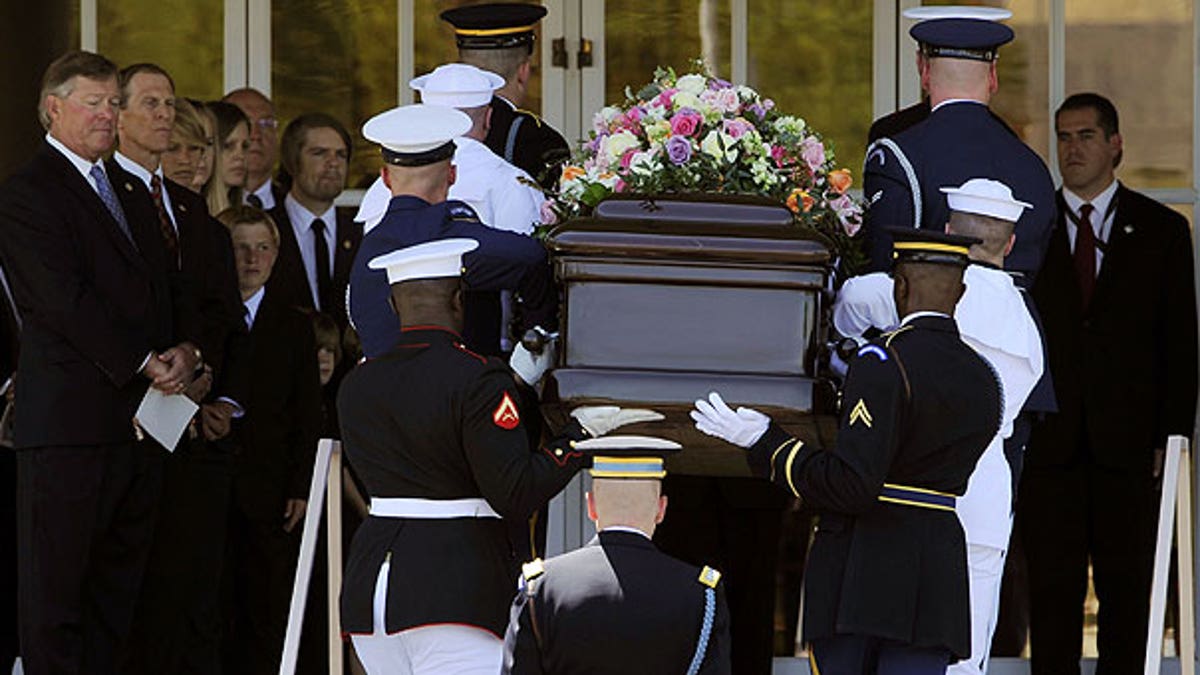
July 12: A military honor guard carries the casket of former first lady Betty Ford into her funeral at St. Margaret's Episcopal Church in Palm Desert, Calif. (AP)
Palm Desert, Calif. – She was more than just a first lady, admirers said of Betty Ford. She was a role model for every presidential wife who followed her into the White House, not to mention a tireless advocate for women's rights and other causes that improved the lives of millions.
Ford, who died Friday at age 93, was memorialized Tuesday by some 800 friends and family members, including no fewer than four current and former first ladies and one ex-president.
On Wednesday she was to leave her adopted Southern California home for the last time, headed to Grand Rapids, Mich., where her husband, President Gerald R. Ford, who died in 2006, is buried.
"Or as she called him, my boyfriend of 58 years of marriage," said her son Michael Ford during a two-hour service at St. Margaret's Episcopal Church in this desert resort town.
A second service was scheduled Wednesday in Michigan at which Lynne Cheney, wife of former Vice President Dick Cheney, was to speak. Among those expected to attend was former first lady Barbara Bush.
On Thursday, Ford is to be interred at her husband's presidential library on what would have been his 98th birthday.
Following Tuesday's California service, members of the public were invited into the church for a viewing that was scheduled to last until midnight.
During the service, former first lady Rosalynn Carter and journalist Cokie Roberts, among others, hailed Ford as a force of nature whose boundless energy and enthusiasm, coupled with a steadfast determination to do what was right, pushed the country toward a commitment to equal rights for women and other causes.
Ford, the accidental first lady, was thrust into the White House when Richard Nixon resigned as president on Aug. 9, 1974, and her husband, then vice president, assumed the nation's highest office. Although she always said she never expected nor wanted to be first lady, she quickly embraced the role.
Her candidness, unheard of at the time, helped bring such previously taboo subjects as breast cancer into the public discussion as she openly discussed her own battle with the disease. She was equally outspoken about her struggles with drug and alcohol abuse, and her spearheading of the creation of the Betty Ford Center to treat those diseases has benefited thousands.
"Millions of women are in her debt today and she was never afraid to speak the truth even about the most sensitive subjects, including her own struggle with alcohol and pain killers," Carter said. "She got some criticism, but I thought she was wonderful and her honesty gave to others every single day."
Behind the scenes she was also aggressive and effective, said Roberts, who noted that Ford's late husband confided to her privately that his wife badgered him relentlessly into stronger public support of equal rights for women.
The former first lady mapped out plans for her funeral well in advance, including who would deliver her eulogies, and Roberts said she told her to be sure to let people know that politics does not have to as acrimonious as it is today.
"Mrs. Ford wanted me to remind everyone of the way things used to be in Washington, and I wouldn't be at all surprised if she timed her death to make sure that she could convey the message of comity during this week, when it seems so badly needed," she said as former President George W. Bush, a Republican, sat in the audience next to Secretary of State Hillary Rodham Clinton, a Democrat.
Sitting in the same pew with them were first lady Michelle Obama, former first lady Nancy Reagan and Carter. Other mourners who packed the church included former California first lady Maria Shriver, former California Gov. Pete Wilson and Ford's four children.
Bush, who escorted Reagan to her seat a few minutes before Obama and the others arrived, chatted with Clinton as they sat next to one another.
"It's very nice to see you getting together after the fact, but we wish some of you would get together beforehand," Roberts said of those in the audience.
Other invited guests included Nixon's daughters, Tricia Nixon-Cox and Julie Nixon Eisenhower; President Lyndon Johnson's daughters, Lucie Baines Johnson and Lynda Bird Johnson Robb; and Robb's husband, former U.S. Sen. Charles Robb.
When Roberts' father, Democratic Congressman Hale Boggs, was the House majority leader and Ford's husband was the House minority leader, Roberts recalled, they could argue about issues but get together as friends afterward. Their families became close, as did the Ford and Carter families, despite Jimmy Carter defeating Gerald Ford in the 1976 presidential election.
Ford not only became a role model to her, Carter said, but also helped show her there was "life after the White House" when her own husband lost his bid for re-election in 1980 to President Ronald Reagan.
Earlier in the day, passers-by, some walking dogs or out for a jog, stopped to reflect on the former first lady's life.
"I don't know where a lot of people would be if it weren't for her," said Randy Gaynor, 47, a recovering alcoholic who stopped to talk to reporters outside the church. "There's been a lot of first ladies and they did a lot of things, but this will be long."

